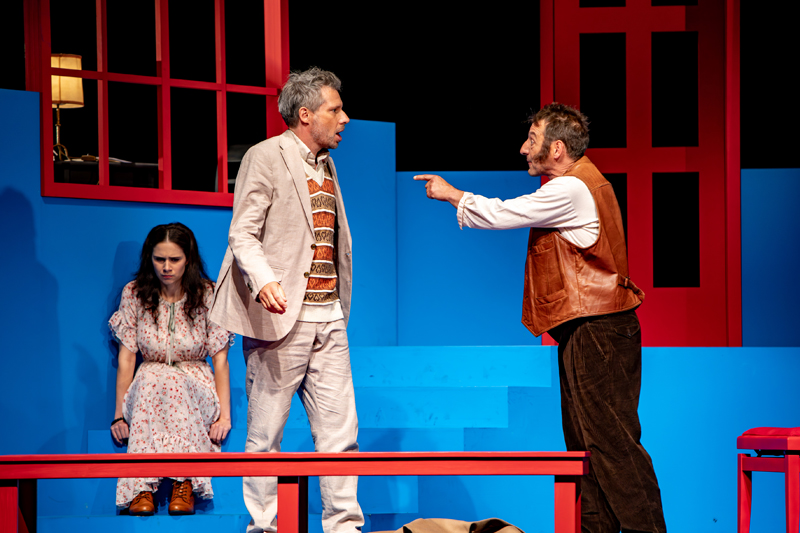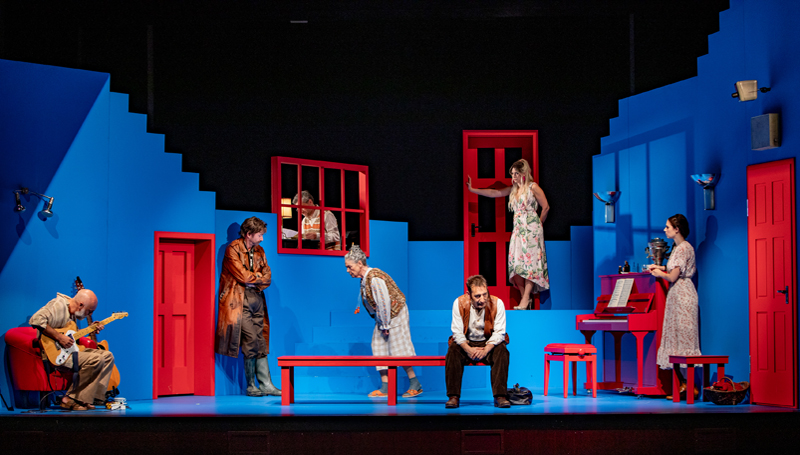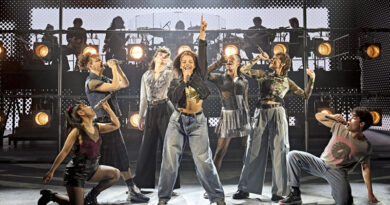“Uncle Vanya”, Schlosspark Theater
Hans-Jürgen Bartsch in Berlin
October 2023
This year, Anton Chekhov’s plays have been as popular as ever in Berlin. Following two productions of The Seagull at Deutsches Theater and the Schaubühne, the Schlosspark Theater opened its 2023/24 season with Onkel Wanja (Uncle Vanya), directed by Anatol Preissler who also designed the set. It is a condensed version of the play for which Preissler, together with his wife Yekaterina Bezghina, had prepared a new translation. The playing time has been reduced from the usual three and a half hours to a mere two, and the “scenes from country life” (as Chekhov has subtitled his play) are presented here as “a life in four instants”, each “instant” corresponding to one of the four acts. There are no scene changes; between the acts the stage simply goes dark for a few seconds.

Helen Barke (Sonya), Tilmar Kuhn (Serebryakov) and Boris Aljinovic (Vanya).
Photo credit: DERDEHMEL/Urbschat.
The set does not evoke any particular period or location, certainly not the ambience of a country mansion in nineteenth-century Russia. All scenes take place in the same room, a wooden two-tier construction with blue walls and bright red doors and windows, sparsely furnished with a bench, an armchair, and two stools, one of them in front of an upright piano, all painted bright red as well. The scenery, resembling a modern painting, is obviously intended to emphasize the play’s relevance for today – without, however, resorting to one of the nowadays trendy adaptations, updates and re-workings “after Chekhov”.
Every line spoken is a faithful rendering of the original text, though newly translated into German by Preissler and his Russian-speaking Ukrainian wife/collaborator. As Preissler explained in an interview, their new translation merely aims at rendering the dialogues more trenchant by accentuating Chekhov’s mordant wit, heeding the author’s advice that his plays should be read as comedies. But it is not as radical as some recent translations into contemporary language, such as the one Brian Friel prepared for Sam Mendes’s staging at London’s Donmar Warehouse in 2002 (which was billed as “Uncle Vanya by Brian Friel – a version of the play by Anton Chekhov”).
Even for the standard request by a theatre assistant to switch mobile phones off and refrain from taking photographs during the performance, Preissler has found an amusing alternative: before the stage lights come on, we hear Vanya’s mother warning us over a loudspeaker that her family “hates to be photographed”. The old lady never appears on stage; throughout the evening she communicates with the other actors via an intercom installed in the wall. And as I discovered to my surprise perusing the programme on the way home, it wasn’t the old opinionated Mariya Voynitskaya who spoke; what we heard was the pre-recorded, perfectly imitated high-pitched voice of Boris Aljinovic, the principal who held the stage as Mariya’s son Ivan aka Vanya!
Mark Weigel (Astrov) and Dagmar Bernhard (Yelena).
Photo credit: DERDEHMEL/Urbschat.
Aljinovic brilliantly succeeds in engendering our sympathy for this middle-aged man who is slaving away to keep the estate afloat, to ensure that his brother-in-law Serebryakov, a vain and selfish hypochondriac (and according to Vanya “a conceited professor of art who hasn’t a clue about art”) may live comfortably in town on the revenues from the estate (“He ruined my life. I haven’t lived”). Faithful to Chekhov’s subtext, he masks disillusion and frustration in self-mockery and irony until his bitterness turns into rage. Unfortunately, and at variance with Chekhov’s stage instructions, the scene where Vanya fetches a pistol and chases Serebryakov across the room has fallen victim to the director’s attempt to increase the play’s comic effects. Veering close to slapstick, the whole cast stumble across the stage in Indian file, following Serebryakov and his pursuer – like children playing cops and robbers. Vanya shoots several times in the air, suggesting that he only intends to scare, not to shoot his adversary. Yet the turbulent scene ends with him quoting Chekhov’s line “Missed again!”
Vanya’s misfortune doesn’t end here. He has a crush on Serebryakov’s young wife Yelena, but his feelings for her are not reciprocated. Dagmar Bernhard portrays Yelena as a beauty queen: wearing a flowery dress with an ostentatious low neckline, she struts across the stage on heeled shoes. She is physically attracted to her admirer, but quite obviously not interested in a relationship. What’s more, Vanya finds himself in competition with his friend, the country doctor Astrov (Mark Weigel) who also has his eye on the young lady. In a touching scene, we watch Vanya enter with a bouquet of roses he has picked for Yelena, only to catch her passionately embracing and kissing Astrov. To see him standing dumbstruck in the doorway with pain and sorrow written all over his face is heart-rending … and confirms Aljinovic as an outstanding actor.
In the role of Astrov, Mark Weigel has been cast as an entertainer who enlivens the show with jocularity. Never saying no to another glass of vodka, he dances, sings, excels in sarcastic bons mots and amuses with inventive jokes, like the one when a phone rings (the ring being imitated by him) and he takes an old dial telephone out of his Gladstone bag and pretends to answer the call. But he, too, suffers from having failed to fulfil his ambitions – to become a good doctor and an influential environmentalist. When he explains to Yelena how the commercialized felling of trees has led to a precarious state of the country’s forests (lines written by Chekhov in 1896!) it is clear that his heart is no longer in it. And emotional indifference (“I feel nothing for anyone”) prevents him from noticing that Vanya’s niece Sonya (Helen Barke) is smitten with him, as she confides in confidence to Yelena (“For six years I have been in love with Astrov”).
Helen Barke is an affecting Sonya. With stoical determination she supports her uncle not only in managing the estate, but also by helping him to overcome his low spirits. As Yelena remarks, she is bright, kind and honest, but unfortunately not pretty. Sonya admits it herself: “I am ugly” – a sentence that should have been deleted from this abridged version of the play; it does not tally at all with Barke’s appearance.
Ilya Telegin, an impoverished landowner from next door and a regular dinner guest at the Voynitskys (Mario Ramos) has transmuted from a talkative raconteur, nicknamed “Waffles”, to a proficient guitar player. We do get the story of how his wife eloped with a lover the day after their wedding and how he stayed faithful to her all his life by not marrying again and supporting her financially, but Ramos’s main task is to provide the musical background, either accompanying Astrov’s songs or as a soloist.
The old nanny Marina (Dagmar Biener) is a calming influence on this quarrelling family, always trying to resolve their disagreements. When she is not serving tea from a samovar placed on the piano, she sits quietly in a corner of the stage, knitting a scarf (bright red of course) which by the end of the performance extends over the whole width of the stage – another of Preissler’s amusing inventions.
The transfer of Chekhov’s play to a contemporary setting works well. This Uncle Vanya is never less than fascinating. The director and his excellent cast deserved the thunderous applause they got at the end of the two-hour performance.










